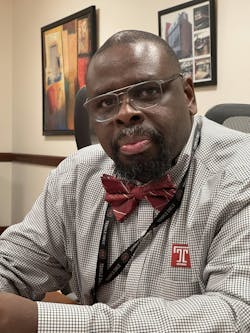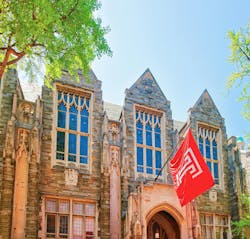Winford Hayes is the locksmith supervisor and facilities manager at Temple University in Philadelphia. We sat down to discuss what’s important when it comes to school security these days.
Locksmith Ledger: Winford, let’s begin with a little background. How’d you wind up at Temple? Did you already have locksmith experience when you got here?
Winford Hayes: Yes, it goes back to 1996 when I took the Foley-Belsaw course. I was fortunate enough to have a mentor, Mr. Ronnie Edwards, who worked at the University of Pennsylvania. He took me under his wing and is there for me to this day. His generation was cut from a different cloth. He began in 1969 at UPenn and was there until 2012.
LL: So, you were ready to work as a locksmith after taking the course?
WH: I started doing it but wanted to be better and learn more. There weren’t any schools in the Philadelphia area, so I went to the Charles Stuart School of Locksmithing in Brooklyn, N.Y. I took the Amtrak train to Brooklyn every morning for a year.
LL: And now you were ready to be on your own?
WH: I went back to working at the University of Pennsylvania. I’ve had a few guys take me under their wing over the years. We’d teach each other what we were good at. During 2011 I became the lead locksmith at Charlotte Douglas International Airport in North Carolina. Under the direction of Christpher Picerno CML, I was responsible for 18 miles of fence and everything in it.
LL: When we say school security, what are we actually securing? Here at Temple, we’re talking about lots of buildings, doors, and departments.
WH: We have many different campuses including Center City and Podiatry downtown. Temple Main here has more than 98 buildings, not including the hospital and our research buildings. We’re protecting students and faculty, and it all comes down to a physical key.
LL: What are the main concerns that are discussed the most?
WH: The students are our first priority since they’re the reason we’re here. We need to make sure they are as safe and secure as possible. It cannot be done without proper key control. That’s the most important part of this thing we call security. How keys are given out as well as all the policies and procedures used to determine who and when to give keys to. We’re probably one of the few universities that requires our vice president to sign off on any master keys given out. It’s taken very seriously. It must be approved by the Vice President for Planning and Capital projects Gennaro (Jerry) Leva and the Associate Vice President Construction Planning and Capital Projects Joseph (Joe) Monahan and myself. It’s all about accountability.
LL: Has it always been done this way at Temple?
WH: Things changed a bit when I got here. We understood how important that Grand Master Key was as well as anyone involved in its use being accountable. During the past year we’ve denied key requests by deans. You have to maintain the integrity of the system in order to be secure.
LL: Even though you say it all comes down to the key, you are using other types of lock hardware here, correct?
WH: We have certain individuals who don’t carry keys, so we have electronic key boxes in some areas for them to access the keys they need. It might be a floor master or the set of keys they’d need for that area. These boxes provide audit trail, so we know who has gotten keys and when they were returned. We’re responsible for 11.5 million square feet so we take accountability very seriously.
LL: Who’s giving out the keys, just you?
WH: We have a very good team of locksmiths that are experienced enough to understand and know what questions to ask when key requests come in. We use Simple K software to keep track, and it uses audit trail. Sometimes the person asks for the wrong key, so we have to really listen and then help them with what they do need. Like the rest of the locksmithing world, the customer doesn’t always know what they really need. Just because someone needs to gain entry to multiple doors doesn’t mean they need a master key, but that’s what they call it. Could be several doors keyed alike.
LL: What kind of process is used when you have a new door to key?
WH: The most important part is to determine who needs access to that room and what does that access look like? Is it an individual or maybe a group? Does the janitorial team need access as well as the rest of the trades?
LL: I know you don’t only use keyed hardware because you purchase Alarm Lock and dormakaba product from us. When are these used?
WH: Typically, these are used in a shared space. It could be a space shared by multiple departments. Then we can give out multiple codes. If only one code is needed, then we can use a Simplex mechanical push button lock. For bathrooms, we’ll use an Alarm Lock Trilogy with privacy function.
LL: Do you think the locksmiths here are viewed as important by the rest of the staff?
WH: People take locksmiths for granted. They think we’re just technical folks who know how to fix things. They think we’re tinkerers. Locksmiths are forgotten until you need to get in or solve a security problem.
We have a college of professional health going up that will have more than 650 cores, but we were the last ones to be notified even though they can’t move forward until the hardware is installed and things are keyed correctly. We’re the forgotten ones but the most important department when it comes to physical security.
LL: In spite of being taken for granted, do you still enjoy what you’re doing?
WH: I enjoy the gratitude part. Some people become police officers or lawyers or building engineers, but the locksmith piece is dear to my heart because we’re in a position to help people and give back. You have lots of power as a locksmith, lots of important decisions to be made. It’s all about security and trust. You wind up working in environments that require special clearance. The police department recently needed someone to come work on their gun safe and most people wouldn’t be allowed back there but I was.
LL: What about pharmaceuticals at the hospital? Anything special happening there?
WH: The hospital pharmacy cannot be keyed to a grand master per the DEA. There are cameras and card readers involved but the biggest concern is the physical key.
LL: Can you talk about situations where electronic security plays an important role?
WH: We have some situations where the electronic locking hardware will shut down in many lecture halls doors. In the case of an active shooter for example, we have buttons that can be pushed and will result in a lockdown. Same thing in classrooms, push a button and you’re locked down.
LL: I was recently approached about supplying a mechanical device on the inside of a classroom that would lock out a shooter. I looked at it and realized it would result in more than one motion to get out. Have you had such requests and how do you handle them?
WH: According to local fire code, you can’t use anything that requires more than one motion for egress. We stick to that because at the end of the day, it’s safety first. We understand and respect the need for security, but safety must come first. You can’t have convenience and effective security. Sometimes we have to compromise convenience for the sake of security and other times we need to compromise a bit of security for the sake of people’s lives.
I’ll give you an example. In the hospital we had ED doors, sliding doors that are ballistic. These sliding doors were coming off the hinges when people would hit them. They wanted to pin them down, meaning the doors couldn’t break away. In my opinion these doors have to be able to break away in case of an emergency. We had to call in Stanley along with the engineers in order to come up with a strategy that would work. Pinning the doors may have worked but in my opinion, it wasn’t the correct solution. There are times when you have to insist on a solution that may be more difficult in spite of what it will take to get there. In this case, egress was most important and that couldn’t be accomplished with the doors pinned down. Eventually they came up with a solution that didn’t compromise security or safety.
LL: Do you find yourself collaborating with others often to come up with solutions in this environment?
WH: “The power of respect is never to disrespect.” That’s a quote from Ray Lewis (football player). Generally, you’re not the smartest one in the room; you don’t know it all. Very often you have to have an open mind and take advice from others. Ask questions so you have the whole picture and surround yourself with the people who will help with the correct solution to a problem. Just because I’m the locksmith supervisor and the facilities manager, the guys I’m working with are the experts. I typically bring my locksmiths to important meetings for their input and so they hear firsthand what the issues are. These guys haven’t spent the last 25-30 years twiddling their thumbs.
LL: Although locksmiths are good at installing and fixing things, more importantly they are problem solvers, correct?
WH: They need to understand the implications and why we’re installing the hardware. The rookie learns the difference between storeroom and classroom function. It’s the simple things that the average person doesn’t realize because it’s not part of their world.
LL: Do you enjoy what you’re doing here?
WH: I do enjoy it. When I look at the big picture, being a facilities manager as well as supervising the locksmith department, it’s very rewarding. What I enjoy the most is teaching the generation coming in behind us. It’s our responsibility to give back. I hear others talk about locksmithing being a dying trade, but I’ve seen things grow immensely since I started. Think about electronics and programming keys for example. I remember when I started, we were only doing regular keys and then VATS with a chip, and you found a value from 1-15 with a multimeter. You’ve got to keep up and I feel strongly about giving back. When I attend meetings with contractors and architects, they see me with a shirt and tie and forget that I’m a locksmith by trade.
LL: When you were taking that train from Philadelphia to Brooklyn every day, if someone told you that years later, you’d be the facilities manager and locksmith supervisor at Temple University one day, what would your reaction have been?
WH: I would never have imagined it. At that point in my life, I just wanted to be a solid locksmith. My mom always told me to have a trade so I could feed and take care of myself. She encouraged me to do something that I’d be able to get certified at and be able to do anywhere I went.
Fifteen to twenty years ago, I may not have seen what was to come but again, my desire is to give back just like my mentors did for me. My faith teaches me gratitude and empathy and these things are taught to me over and over in this trade. I don’t see my guys as working for me; we work as a team.
LL: What would you suggest to others in our field when it comes to progress?
WH: I believe strongly in education. We need training and I believe in the importance of joining ALOA. Somebody brought me into the organization in 2003 and it’s my responsibility to do the same for others.
LL: How do you see the industry in the future? What will we have that we don’t have currently?
WH: I’m going back to the mechanical key, the foundation of locksmithing. I see other places using smart systems and technology but at the end of the day, you’ll need a physical key to get in or at least to override the system. I had a service call from a large company downtown. If they’re calling me, it must be serious since I don’t do much work outside of the university. They were locked out of their data room and there was no key override. It shut down, fail secure. I eventually got them in without drilling or destroying anything, a clean bypass.
Steve Kaufman has worked for distributors in the locksmith industry since 1993 and worked as a full-time locksmith from 1978 through the 1980s. Kaufman is the sales manager for IDN Hardware out of its Philadelphia location.
About the Author
Steve Kaufman
Steve Kaufman has worked for distributors in the locksmith industry since 1993 and worked as a full-time locksmith from 1978 through the 1980s. Kaufman is the sales manager for IDN Hardware out of its Philadelphia location.


